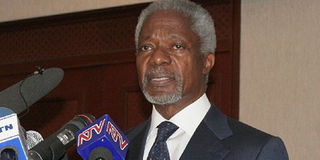Waki envelope still causing ripples

Former UN secretary-general, Kofi Annan. Photo/FILE
When Kofi Annan received a sealed envelope from Justice Philip Waki in Nairobi last October, the chief mediator of the Kenyan post-election crisis might not have anticipated the domino effect of that simple gesture.
There have been more ripples since then. Political analysts trace the tipping point for the troubled coalition government to the moment it became apparent that names of some top people in PNU and ODM were on the Waki list.
The current stalemate between President Kibaki and Prime Minister Raila Odinga over who has the powers to discipline two ministers regarding corruption allegations has pushed the coalition to the brink of collapse.
Hassan Omar Hassan, the vice-chairman of the Kenya National Commission on Human Rights (KNCHR), says the release of the Waki report created competing alliances of politicians apprehensive that prosecutions might damage their political careers on the one hand and others hoping to benefit from such action on the other hand.
“The net effect of the Waki list is that former allies within both parties broke ranks, creating an alliance of people fighting for their political lives and another one of those who don’t want to be seen to be associating with them. It may also determine who the main players in the political field will be in 2012,” says Mr Hassan.
Currently in the custody of the International Criminal Court (ICC), the contents of Waki envelope are widely expected to form the basis of anticipated high-profile prosecutions of the Kenyan case at The Hague.
The fallout over the Waki envelope has not just changed the country’s political landscape; it has also shaken the coalition to the core and set in motion events that put in doubt chances of the coalition surviving to the next General Election in 2012.
A third political force gravitating around key PNU figures and a grouping of their counterparts in ODM has significantly weakened the Orange party’s position in the Cabinet and Parliament and tipped the balance of power in the coalition in favour of PNU. It also threatens Mr Odinga’s role as supervisor and coordinator of government affairs while strengthening President Kibaki’s grip.
In the wake of President Kibaki overturning Mr Odinga’s decision to suspend Agriculture minister William Ruto and Education minister Sam Ongeri, the new alliance has smelt blood and appears set to move in for the kill when Parliament reopens this week.
PNU plans to bring a motion to the House seeking to have Vice-President Kalonzo Musyoka installed as Leader of Government Business after Mr Odinga’s claim to the same post caused a stalemate last year.
Rebel ODM MPs have in the past indicated they would support a vote of no-confidence against the PM if it were brought to the House. Mr Ruto and Tourism minister Najib Balala have publicly stated they would defy a party position requiring ODM ministers to boycott Cabinet meetings over the current crisis.
Anxiety over the Waki envelope is set to build once again as MPs prepare to debate the Witness Protection Bill, which seeks to secure crucial evidence needed to prosecute post-election violence and set the stage for the next round of investigations by the ICC. Luis Moreno-Ocampo, the prosecutor, is expected to indict the key suspects between June and July.
Back home, a move by Mr Moreno-Ocampo on the suspects may yet prove to be Mr Odinga’s worst nightmare. Not only will it add fuel to the growing opposition against him, it is also likely to erode his popularity among a section of voters considered key to his presidential bid in 2012.
Pockets of demonstrations were reported in parts of Rift Valley Province after the PM announced he had suspended the two ministers. A group of internally displaced persons also attempted to march over 200 km from their camp in Nyahururu to State House, Nairobi, to demand compensation. The two incidents are seen as lending credence to fears that taking action against prominent people could cause political instability in the country.
“It will be politically risky for Mr Odinga to appear to be supporting The Hague trials because he is likely to be alienated in Parliament and government. But it is a risk he has to take if he wants to boost his presidential ambitions in 2012. He enjoys some leverage because the issue of justice for post-election violence victims is popular with the public,” Mr Hassan said.
The KNCHR deputy chief also describes fears that the country will erupt into violence in the event the key suspects are charged exaggerated, citing the examples of Sudan, Liberia and Yugoslavia which have experienced relative peace despite international courts indicting their presidents.
“If people who controlled huge armies and militia groups were indicted and the citizens in those countries moved on with their lives, what of one or two politicians in Kenya? The majority of Kenyans want to live in peace and justice,” he said.




